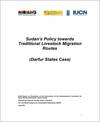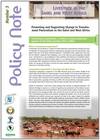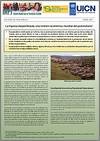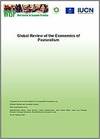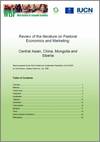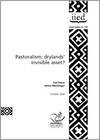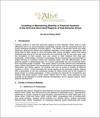The study contributes to building an enabling environment for pastoral sustainable rangeland management through enhanced local-level advocacy based on sound knowledge management on the impact of current policies on pastoralism. This Sudan case study is focused on the national policy towards Traditional Livestock Migration Routes (Darfur States Case). The study evaluates the success of the intervention carried by The Administrative Committee for Routes Delineation - Darfur States (ACRD-DS) and the impact this has had on the wider pastoralist environment. It contributes to WISP’s efforts to demonstrate that, given an enabling policy environment, pastoralists can be the best custodians of the drylands environment.
Year of publication: 2007Organization: , Autores individuales, Unión Internacional para la Conservación de la Naturaleza (IUCN)
Topic: Organización
Language: English
Type of document: Técnico
Geographical coverage: África Oriental
Transhumant pastoralism is a reality in animal production systems in the Sahel and West Africa (SWA), which despite its importance, it still faces serious obstacles that threaten its potential production. This policy note aims at highlighting the best ways at international and regional levels in order to develop and implement policies and strategies aimed to support transhumant pastoralism while creating conditions for change to sedentary agro-pastoralism.
Year of publication: 2007Organization: Autores individuales, Banco Mundial
Topic: Economía, Innovación
Language: English
Type of document: Políticas y legislación
Geographical coverage: Norte de África, África Occidental, África Central
La ganadería móvil es el modo más sostenible de manejar los pastizales del mundo y los usos de tierra alternativos se asocian con costos ambientales y económicos. La magnitud de costos no quedan bien entendidos y pueden incurrirse sin que la gente se de cuenta de ello. Si un país que posee amplios pastizales desea reversar la desertificación y superar la pobreza, es esencial que reconozca la lógica ambiental de la ganadería móvil y su gran potencial económico.
Year of publication: 2007Organization: Unión Internacional para la Conservación de la Naturaleza (IUCN)
Topic: Economía
Language: 中文, English, Français, Español
Type of document: Políticas y legislación
Geographical coverage: Global
Esta revisión de la literatura sobre el pastoralismo es una contribución al sobre mundial sobre la importancia del pastoralismo móvil como forma una forma productiva y sostenible de manejar la tierra. La revista tiene como objetivo el poner de relieve el conocimiento que existe sobre el valor del pastoralismo, las lagunas de conocimiento que hay, las tendencias en las economías pastoralistas y las opciones de política que pueden con más eficacia apoyar las economías de las tierras áridas.
Year of publication: 2006Organization: Unión Internacional para la Conservación de la Naturaleza (IUCN)
Topic: Economía
Language: English, Français, Español
Type of document: Técnico
Geographical coverage: Global
Eight regional studies were carried out in the context of the Global review of the economics of pastoralism. The studies identify how pastoralism contributes to domestic and global markets in different regions. The studies capture the following regions: Horn of Africa and Southern Africa; West Africa; Eastern Africa; Northern Africa; South America; Asia; Middle East; and Europe.
Year of publication: 2006Organization: Unión Internacional para la Conservación de la Naturaleza (IUCN)
Topic: Economía
Language: English
Type of document: Técnico
Geographical coverage: Norteamérica, Latinoamérica, Europa, Cercano Oriente, Norte de África, África Occidental, África Central, África Oriental, África Meridional, Asia Central, Asia Meridional
Many policy makers in East Africa have preconceptions about the value of pastoralism as a land-use system believing it to be economically inefficient and environmentally destructive. Yet, this is not evidence-based. Not only is there no consensus on what is a dynamic economic model of pastoralism, no mechanisms exist to inform government decision-making of its comparative advantages over alternative land uses. A new conceptual framework is needed to assess the value of pastoralism that goes beyond conventional economic criteria in order to provide fresh insights to its contribution to poverty reduction, sustainable environmental management and the economic development of dryland areas of East Africa in the context of increasing climate uncertainty. This paper proposes such a framework.
Year of publication: 2006Organization: Instituto Internacional de Medio Ambiente y Desarrollo (IIED)
Topic: Economía, Valeur ajoutée
Language: English, Français
Type of document: Técnico
Geographical coverage: África Oriental
This paper seeks to provide national and international policy-makers interested in the development of arid and semi-arid areas with background information and policy options, on whether and how to invest in mobility of pastoral systems in Africa. It first describes the trends leading to declining mobility, followed by a description of the key underlying causes for these trends and their impacts on mobile pastoralists. It then provides the rationale for investments and concludes with policy options which policy-makers face when deciding on priorities to be allocated to overall pastoral development, and to specific actions within pastoral development.
Year of publication: 2006Organization: Organización de las Naciones Unidas para la Alimentación y la Agricultura (FAO)
Topic: Economía, Valeur ajoutée
Language: English
Type of document: Técnico
Geographical coverage: África Occidental, África Central, África Oriental, África Meridional
This toolkit gathers together information on 10 tools that have been successfully used by members of the International Land Coalition (ILC) to promote, protect, and strengthen the land rights of Indigenous Peoples and local communities. It is intended to facilitate mutual learning based on the good practices of specific ILC members. The opportunity to share knowledge is one of the main benefits of being part of a network like the ILC. Use these tools, adapt them to your specific context, share them with your partner organisations, and share with us your achievements and successes!
Year of publication: 2005Organization: Coalición Internacional para el Acceso a la Tierra (ILC)
Topic: Conflicto, Servicios ambientales, Pueblos indígenas, Tierra, Participación
Language: English
Type of document: Técnico
Geographical coverage: Global


